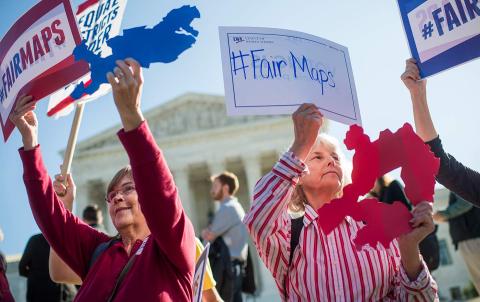Should lawmakers be allowed to draw electoral districts to protect their party from competition? Can the courts rule legislative and congressional maps unconstitutional on the basis of partisan and political discrimination?
Those are among the questions the Supreme Court is considering in the case Gill v. Whitford.
To give you a brief overview, Gill v. Whitford is a partisan gerrymandering case out of Wisconsin in which a group of Democratic voters are challenging legislative districts drawn by the Republican-controlled legislature.
Though the statewide vote is split nearly 50-50 between Republicans and Democrats, Republicans control two-thirds of the legislative seats. A district court ruled that the legislative districts were unconstitutional.
The ruling was significant because it was the first time a federal court ruled electoral districts constituted a gerrymander not on the basis of race or class, but because they discriminated against voters on a partisan basis.
Now, the case is in the hands of the Supreme Court, which could overturn its previous ruling in 2004 (Vieth v. Jubelirer) that there was no measurable or judicial standard for determining when electoral districts were "too partisan."
The majority of state legislatures in the US draw the electoral districts for their state, and whether we are talking about Republican-controlled Wisconsin or Democratic-controlled Maryland, the party in power draws electoral districts to protect their incumbents and maintain power.
By cramming voters outside the party into a handful of districts, they dilute the voting power of minority parties and independents, shut out competition, and distort representation.
In other words, lawmakers in most states pick their voters, not the other way around. And when we asked IVN readers if legislators should be allowed to draw districts to protect their party from competition, most responded with, "Seriously, this is legal?"
Over 2,000 IVN readers reacted to the poll, nearly 1,400 of whom selected the final option, and no one responded, "Yes." Here is what some IVN readers had to say:
What do you think? Is Gill v. Whitford an opportunity to end partisan gerrymandering?
Photo Source: AP
